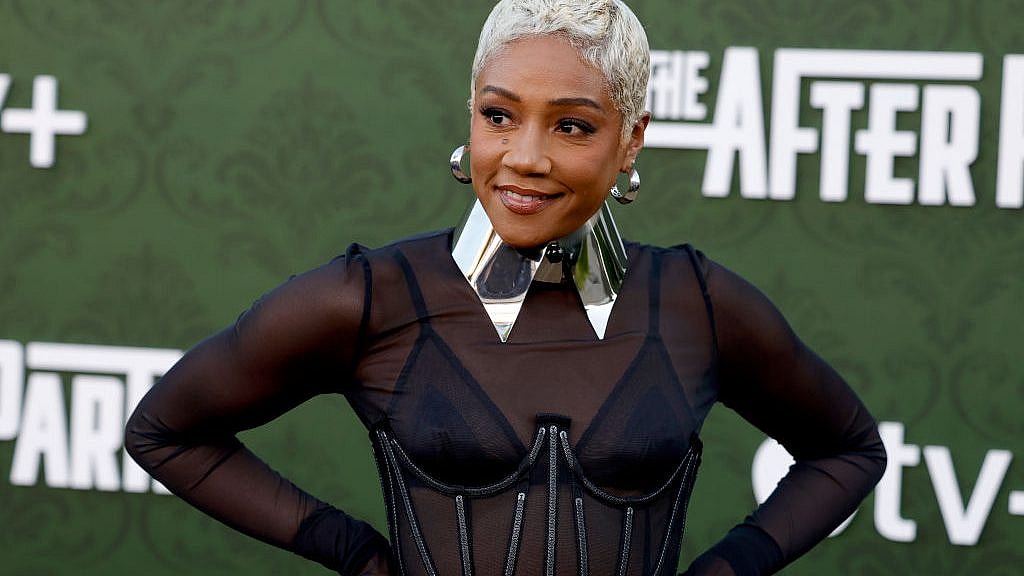Speaking to Entertainment Tonight about an arrest following a DUI, Tiffany Haddish said it “will never happen again,” vowing to get help.
In the wee hours of Friday morning, the Beverly Hills Police Department claims the comedian and actress was found asleep in her car, which witnesses claim was stopped in the middle of the road on Beverly Drive in Los Angeles. Haddish told the publication her Tesla parked itself when she fell asleep and was left blocking a portion of the road.

Haddish explained Friday’s incident occurred after a “long Thanksgiving Day” that included feeding the hungry at The Laugh Factory’s 43rd annual free feast and treating the crowd to a special holiday set.
Regardless, she said, “I’m going to get some help so I can learn balance and boundaries.”
This is Haddish’s second DUI. As previously reported by theGrio, the first was in January 2022 in Atlanta, when Haddish was arrested after officers responded to a report of someone asleep behind the wheel. At that time, Haddish faced charges of DUI and improper stopping on a roadway and was released on a $1,666 bond.
As with the first incident, Haddish has been open about her responsibility. She has even taken the first step in getting help: admitting she has a problem.
In a country where drinking rates are rising and at a time of year when drinking is known to spike, Haddish isn’t alone. Statistics indicate that while problem drinking and alcohol abuse aren’t as pervasive in the Black community as others, we are not immune.
“Economically, systematically, and historically, our relationship with alcohol looks differently than other demographics or other groups of folks,” Khadi Oluwatoyin, founder of the Sober Black Girls Club, told theGrio.
Getting help is a nuanced process for most that could involve understanding what problematic drinking is and how normalized it has become, finding culturally relevant resources, and adjusting lifestyles accordingly. It’s also a noble step that deserves grace and support, especially during this time of year.
If you or someone you know may be struggling with alcohol abuse, below, we break down what problem drinking is, what getting help could look like, and highlight culturally competent resources specific to Black folks.
What is problem drinking?
Problem drinking is when a person’s drinking regularly results in negative consequences such as health issues, financial trouble, fights with loved ones, and DUIs — however, it isn’t necessarily driven by an addiction or disorder, according to the American Addiction Centers. If it goes unchecked, it can increase the likelihood of developing a disorder or dependency, which could make breaking the habit that much harder.
Knowing your family history with addiction is helpful in understanding the likelihood that you could develop a disorder or dependence on alcohol.
What does getting help look like?
Help is out there. For starters, those seeking help can reach out to the Substance Abuse and Mental Health Services Administration’s national hotline for confidential and immediate help 24/7 at 1-800-662-HELP (4357).
Anyone questioning how drinking is impacting their lives should also consider checking in with a professional therapist or counselor who may recommend further treatment, including 12-step programs or rehabilitation centers.
Help may also involve finding the right community to rally around you. Folks who practice a faith may be able to find help within their spiritual community, including from faith leaders. There are also a variety of clubs and groups dedicated to providing community to those who are sober.
Where can you go for culturally competent resources?
The Sober Black Girls Club is one of a handful of organizations helping Black women and femmes on their individual sobriety journeys find resources, including community, therapy, strategies for staying sober, and more.
A quick search online will yield many more national and local organizations dedicated to helping Black people on their journey, including The Miracles Club in Portland, Therapy for Black Men, and Therapy for Black Girls.
What are some ways you can change or adjust your lifestyle right now?
A person attempting to cut back or start a sobriety journey doesn’t have to wait to join a 12-step program or get in front of a substance abuse counselor to make changes. The changes don’t have to be major. You could test out different alcohol-free drinks or mocktails when you go out to develop a new routine. There are a growing number of sober bars, sober events, and even sober cocktails and spirits; F1 champion and tequila connoisseur Lewis Hamilton just released his very own alcohol-free tequila line, Almave.
With a growing number of people adopting sober lifestyles and more conscious habits, remember, if you are interested in sobriety or more responsible drinking, you are not alone, and help is out there.
Never miss a beat: Get our daily stories straight to your inbox with theGrio’s newsletter.

